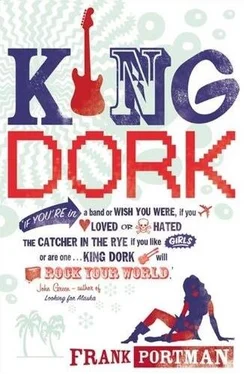Frank Portman - King Dork
Здесь есть возможность читать онлайн «Frank Portman - King Dork» весь текст электронной книги совершенно бесплатно (целиком полную версию без сокращений). В некоторых случаях можно слушать аудио, скачать через торрент в формате fb2 и присутствует краткое содержание. Жанр: Старинная литература, на английском языке. Описание произведения, (предисловие) а так же отзывы посетителей доступны на портале библиотеки ЛибКат.
- Название:King Dork
- Автор:
- Жанр:
- Год:неизвестен
- ISBN:нет данных
- Рейтинг книги:4 / 5. Голосов: 1
-
Избранное:Добавить в избранное
- Отзывы:
-
Ваша оценка:
- 80
- 1
- 2
- 3
- 4
- 5
King Dork: краткое содержание, описание и аннотация
Предлагаем к чтению аннотацию, описание, краткое содержание или предисловие (зависит от того, что написал сам автор книги «King Dork»). Если вы не нашли необходимую информацию о книге — напишите в комментариях, мы постараемся отыскать её.
King Dork — читать онлайн бесплатно полную книгу (весь текст) целиком
Ниже представлен текст книги, разбитый по страницам. Система сохранения места последней прочитанной страницы, позволяет с удобством читать онлайн бесплатно книгу «King Dork», без необходимости каждый раз заново искать на чём Вы остановились. Поставьте закладку, и сможете в любой момент перейти на страницу, на которой закончили чтение.
Интервал:
Закладка:
Some of the Jazz Band paraphernalia remained, however, and it included a couple of amplifiers that were buried behind and underneath several layers of other band-related junk.
There was a Polytone twin guitar amp, and a Fender Bassman, which was actually a legitimately cool amp, though I gather from reading interviews with real rock guys that the cool way to use the Fender Bassman is as a guitar amp rather than a bass amp. Anyway, they were better than the nothing we had. And they were free. In a sense.
151
The band room was normally locked when not occupied, of course, but Sam Hellerman had a key to the main building because he had signed up for a practice room. And he had somehow temporarily rigged the band room door so it wouldn’t latch properly when Ms. Filuli, the band teacher, left the building. That boy is a criminal genius.
We had to burrow through quite a few layers, but it didn’t take long. The school was deserted; everyone was either at the Pep Rally or skipping the Pep Rally. So no one was there to notice when I picked up the Polytone and just walked out with it. No one even came to investigate when Sam Hellerman wheeled the creaky Fender out of the band room and into the hall, even though its wheels made a squealing sound like I imagine a five-year-old girl might make if someone hung her outside a window by the ankle. Preventing geeks from swiping decrepit school property wasn’t high on everybody’s list of priorities that day.
We replaced all the band room junk and jumbled and jos-tled it a bit so it looked pretty much as it had before, kind of like how you would trample on the dirt on top of a grave you didn’t want anyone to find out about. Hardly anyone even knew the amps were there in the first place, so we were pretty safe. We left the school grounds and took turns wheel-ing the Fender with the Polytone on top of it back to my house. I had an absurd feeling of (devil-head) euphoria, like we were on our way.
What finally made us get off our asses and solve the amp problem? Well, there had been another big development, bandwise. Sam Hellerman had taken some time off from his busy schedule of keeping tabs on Celeste Fletcher’s ass and had managed to scare up a drummer. An actual drummer. I kid you not. His name was Todd Panchowski, he had a drum 152
set, and for reasons that remain dark to this day, he hadn’t flinched at the idea of being in a band with Sam Hellerman and me. Well, actually, he took determined steps to make it clear that he wasn’t “in” the band, so maybe that was it.
There were other bands he was “in.” When he talked about our band (which when we met him was Arab Charger, me on guitar, The Fiend in Human Shape on bass and preventive dentistry, first album Blank Me ) he would always say we were “jamming,” which is less committed sounding than practicing or playing.
The Polytone didn’t sound too bad with the distortion box, the Overlord II. Much louder than the cow mouth. The Fender Bassman didn’t work when we first plugged it in, but that was just because the tubes were missing. Sam Hellerman had anticipated that and was ready with a new set of tubes that he got from the electronics store. I thought it sounded nice, though I think he was secretly pining for the thin, burbly, distorted Magnavox sound.
We plugged this cheesy microphone from Amanda’s mini-karaoke set into the Bassman’s second channel and taped it to a bamboo pole from Little Big Tom’s gardening supplies, and stood the pole up by sticking it in the red and green Christmas tree stand from the basement. It looked ex-otic. The mic squealed a bit, and it was kind of hard to get it so that we played all at the same time, but it was loud and we sounded—well, not exactly like a rock band. More like three different rock bands with one member each playing different songs at the same time. But we played “Surrender” and
“Cretin Hop,” “Fox on the Run,” and “Whole Lotta Rosie,”
sort of, and if our attempt to do my own song, “Wetness for the Prosecution,” sounded a bit more experimental than intended, it was still pretty cool in a Trout Mask Replica kind of way. Or so I kept telling myself.
153
This was all happening in the living room of my house.
Little Big Tom popped in at one point. He tilted and said something I couldn’t hear. We stopped and waited expectantly.
“Living room rock!” he said. I guess I had been hoping for a comment on the song, “I Pledge Allegiance to the Heart.”
But it was probably pretty hard to make out the lyrics. Plus the mic kept shocking me, so I was shying away from it and not putting a lot into the singing. Living Room Rock was pretty funny, though, and I made a note to self to use it for an album title or something someday. Actually, it was one of the best band names I’d ever heard. . . .
Now, Todd Panchowski was a Christian stoner. That is, he was a stoner who had joined a Christian youth group to deal with his inner turmoil and problems at home and to find guidance and a sense of community. There were a few of those around. The youth group was called the Fellowship. In my experience, despite the cheerful hobbit-evoking name and their (devil-head) ostensible ethical standards, the Fellowship people were just as sadistic and psychotic as any other normal people. Maybe they were nice to each other behind closed doors and reserved their hazing for people of other religions or something. I didn’t really know a lot about them.
I don’t want to get into the whole stoner classification system, but I should mention that practically every member of the Hillmont student body is technically a stoner, in that they all do various mild drugs continually and are pretty much always stoned to some degree. The difference is that the stoner stoners wear heavy metal T-shirts while doing it.
They tend to be nicer to be around than full-on normal people, though, because their ideology includes a self-perceived admiration for social misfits. That part is contrived and not very sincere, perhaps, but in fact they don’t hassle me nearly 154
as much as normal people do. I even get points for my ency-clopedic knowledge of firearms and rock and roll history. I’m not one of them, but they don’t actively seek to destroy me, and that’s a nice novelty.
One more thing: all the psychotic normal people are well aware that there is something weird about dismissing people as “stoners” when the stoners differ from themselves only in the kind of T-shirts they wear and in the diminished ferocity of their attacks on the defenseless. So they prefer to call stoners “burnouts.” But that’s a more appropriate term for teachers, if you ask me.
Todd Panchowski was not without his Fellowship-related quirks, as we soon learned when we started to play with him.
He was okay with playing our songs, and in fact didn’t seem to pay too much attention to the words or music. I guess he was so busy hitting things with sticks that he didn’t really have a thought to spare for the content. But there was one song he insisted that we do, and it was kind of an abomina-tion. I guess he had picked up the idea at the Fellowship meetings, where they do God only knows what. What he wanted to do was to play “Glad All Over.” (Not the Carl Perkins “Glad All Over.” The other one.) Now, I love “Glad All Over,” don’t get me wrong. But instead of singing “ You make me feel glad all over,” like the Dave Clark Five or the Rezillos, he wanted it to go “ He makes me feel glad all over.”
Like you’re singing it about Jesus instead of a hot girl, get it?
I tried to explain to him that “glad all over” had a double meaning, a code meaning, like “giving her the time,” and that the song wasn’t about how great you feel when you read Paul’s First Letter to the Thessalonians. Unless you’re weird.
Читать дальшеИнтервал:
Закладка:
Похожие книги на «King Dork»
Представляем Вашему вниманию похожие книги на «King Dork» списком для выбора. Мы отобрали схожую по названию и смыслу литературу в надежде предоставить читателям больше вариантов отыскать новые, интересные, ещё непрочитанные произведения.
Обсуждение, отзывы о книге «King Dork» и просто собственные мнения читателей. Оставьте ваши комментарии, напишите, что Вы думаете о произведении, его смысле или главных героях. Укажите что конкретно понравилось, а что нет, и почему Вы так считаете.












